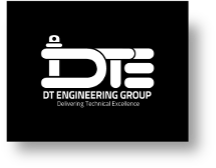DT Engineering

DTE Engineering is a long-established specialist engineering company based in Runcorn, Cheshire. The company specialises in the design and manufacturing of materials handling solutions for heavy objects in production environments, such as automotive, ports, logistics and manufacturing. DTE Engineering also develops innovative and bespoke solutions for their customers, including Jaguar Land Rover and Peel Ports.
Challenge
DTE wishes to develop their crane safety system (DG “Digital Trident”) to identify blind spots and investigate and determine the feasibility of incorporating Machine Learning (ML) and Artificial Intelligence (AI) technologies to improve the overall effectiveness of the system.
The development phase is anticipated to involve a Pilot Study with a potential end user, such as Peel Ports. The successful delivery of a Pilot Study will enable the company to exploit the new knowledge in delivering an advanced, fully working crane safety system meeting the requirements of identified customers.
Solution
The initial course of action was the development and submission of a UKRI (UK Research and Innovation) AKT Bid Proposal to fund the development work, including the appropriate technical and scientific work to be undertaken by Horizons partner, Faculty of Engineering and Technology at Liverpool John Moores University (LJMU).
LJMU’s Technical Experts and Knowledge Base have led the development and delivery of the Bid proposal, including the created work plan activities, project costings and the structure and operational systems required for effective and efficient Knowledge and Innovation Management.
This partnership between DTE and the LJMU Knowledge Base has provided the technological capability and expertise required to bring the Innovation closer to market for DTE.
The ML and AI expert knowledge is essential for the innovation and development of the technical capability required for the advanced crane safety system, driven by customer operational demands.
Impact
A strong AKT bid proposal was submitted to UKRI, which scored (76%) above the funding criteria (65%) but unfortunately did not receive funding due to the Call being over-subscribed.
The excellent score for the December 2023 AKT Proposal given by a panel of independent evaluators is evidence of a strong business and technical case for the DTE “Trident” Crane Safety System development and the justification of the proposed work plan and technical development.
The LJMU’s teams are now working with DTE to use the work undertaken for the AKT to formulate a full KTP (Knowledge Transfer Partnership) Proposal with a target for the June 2024 Call.
Additional interim development work is being planned via a dedicated UKRI AI funding proposal, to be submitted in the early phase of May 2024 (as well as potential industry funding), which could extend further product research, development, and knowledge transfer until at least 2025.
LJMU will continue to work with DTE, preparing to submit the grant funding proposals and to support the commercial and technical development of the Crane Safety System where appropriate.
There is an increasingly strong business case for the development of this safety-critical system, with DTE’s lead customers ready to release purchase orders, such is the urgency for this type of intelligent crane safety system to be implemented in the workplace.
There remain numerous technical obstacles that must be addressed before DTE can provide an MVP to their customers. LJMU’s Horizons Team will persist in collaborating with DTE to help them reach this goal.